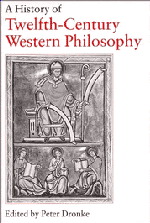Book contents
- Frontmatter
- Contents
- Preface
- Contributors
- List of abbreviations
- Introduction
- I Background
- II New Perspectives
- 5 Scientific speculations
- 6 Speculative grammar
- 7 Logic (i): from the late eleventh century to the time of Abelard
- 8 Logic (ii): the later twelfth century
- III Innovators
- IV The Entry of the ‘New’ Aristotle
- Bio-bibliographies
- General Bibliography
- Index of Manuscripts
- General Index
5 - Scientific speculations
Published online by Cambridge University Press: 01 June 2011
- Frontmatter
- Contents
- Preface
- Contributors
- List of abbreviations
- Introduction
- I Background
- II New Perspectives
- 5 Scientific speculations
- 6 Speculative grammar
- 7 Logic (i): from the late eleventh century to the time of Abelard
- 8 Logic (ii): the later twelfth century
- III Innovators
- IV The Entry of the ‘New’ Aristotle
- Bio-bibliographies
- General Bibliography
- Index of Manuscripts
- General Index
Summary
In his Dialogi (an apologia for Christianity, couched in the form of a series of dialogues between the Christian Petrus and the Jew Moses) Petrus Alfonsi undertakes to prove God's existence ‘philosophically’:
Petrus: Those who make their faith correspond to the Scriptures do not deny that God exists, and therefore it was not necessary to prove this to those who believed in the Scriptures, but only to those who believed in no written word.
Moses: Since you refuse to prove through the Scriptures that God exists and he is able to be comprehended by no corporeal sense, I very much want to hear by what philosophical ratio this can be proved.
In the Tractatus de sex dierum operibus Thierry of Chartres writes:
There are four kinds of rationes which lead man to the recognition of his creator – i.e. the proofs of arithmetic and music, geometry and astronomy.
At another point in the Dialogi Petrus has Moses ask:
I would like you to explain this to me, if you know it: Wherefore and how, according to the laws of physics (secundum physicam), did Adam, because of disobeying the command, lose that equality in the composition of his body, which he had prior to the Fall?
Again in his Tractatus Thierry undertakes to explain the first part of Genesis secundum physicam.
Both Petrus Alfonsi and Thierry claim to be using proofs or ways of reasoning independent of scriptural authority for investigating divine things.
- Type
- Chapter
- Information
- A History of Twelfth-Century Western Philosophy , pp. 151 - 176Publisher: Cambridge University PressPrint publication year: 1988
- 4
- Cited by



